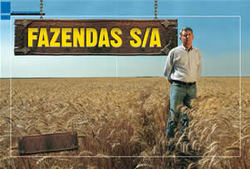Published: 06 Jan 2012
Posted in: SLC Agricola
Agrimoney.com | 6 January 2012

SLC Agricola took its Brazilian landbank above 300,000 hectares, an area bigger than Luxembourg, with its fourth purchase in four months, in a deal which highlighted the price gap between different parts of the country.
The farm operator brought its land holdings to nearly 306,000 hectares with the purchase of 28,837 hectares in Mato Grosso, Brazil's top soybean producing state, for R$86.1m ($46.8m).
The deal followed three farm purchases by SLC in late 2011 in Mapitoba - the increasingly popular north eastern part of Brazil, comprising Maranhao, Piaui, Tocantin and Bahia states, which was largely overlooked in the late-2000s' wave of agricultural expansion.
Price differences
Indeed, the SLC deals highlighted an outstanding gap in prices between Mapitoba and Mato Grosso.
Taking account of the 19,000 hectares of the new plot which SLC did not rate as "physically productive", the latest deal, including grain silos, worked out at more than R$9,000 ($4,900) per farmed hectare.
That is 40% more per hectare than it paid in September for a Piaui farm also equipped with grain storage. SLC purchased two lots of undeveloped Mapitoba land for well under R$5,000 a hectare.
However, the widespread practice in Mato Grosso of second cropping means that the actual farmed area at the new holding will reach 14,500 hectares a year, SLC said.
On that basis, the cost falls below R$6,000 a hectare.
Mato Grosso itself is not the most expensive state, being situated thousands of kilometres from ports, much along dirt roads. More accessible Sao Paulo and Minas Gerais land tends to attract far higher prices.
Land reforms
Brazilian land prices overall have tripled, since 2002, hitting $14,000 a hectare in some parts, consultancy Informa Economics FNP said last month.
The rise included an 18% increase last year, despite Brazil revealing limits on purchases by foreigners.
Brazil's parliament is set to vote next month on proposal to limit to 2,500 hectares the purchase and lease of land by foreigner. Companies controlled by non-Brazilian capital will be limited to 5,000 hectares.
Furthermore, no more than 25% of land in any municipality can be foreign-owned or leased, with no single non-Brazilian nationality to hold more than 10%.

Eduardo Logemann of SLC Agricola. He and his family own 51% of the company, with the remaining shares traded on Brazil's Bovespa.
SLC Agricola took its Brazilian landbank above 300,000 hectares, an area bigger than Luxembourg, with its fourth purchase in four months, in a deal which highlighted the price gap between different parts of the country.
The farm operator brought its land holdings to nearly 306,000 hectares with the purchase of 28,837 hectares in Mato Grosso, Brazil's top soybean producing state, for R$86.1m ($46.8m).
The deal followed three farm purchases by SLC in late 2011 in Mapitoba - the increasingly popular north eastern part of Brazil, comprising Maranhao, Piaui, Tocantin and Bahia states, which was largely overlooked in the late-2000s' wave of agricultural expansion.
Price differences
Indeed, the SLC deals highlighted an outstanding gap in prices between Mapitoba and Mato Grosso.
Taking account of the 19,000 hectares of the new plot which SLC did not rate as "physically productive", the latest deal, including grain silos, worked out at more than R$9,000 ($4,900) per farmed hectare.
That is 40% more per hectare than it paid in September for a Piaui farm also equipped with grain storage. SLC purchased two lots of undeveloped Mapitoba land for well under R$5,000 a hectare.
However, the widespread practice in Mato Grosso of second cropping means that the actual farmed area at the new holding will reach 14,500 hectares a year, SLC said.
On that basis, the cost falls below R$6,000 a hectare.
Mato Grosso itself is not the most expensive state, being situated thousands of kilometres from ports, much along dirt roads. More accessible Sao Paulo and Minas Gerais land tends to attract far higher prices.
Land reforms
Brazilian land prices overall have tripled, since 2002, hitting $14,000 a hectare in some parts, consultancy Informa Economics FNP said last month.
The rise included an 18% increase last year, despite Brazil revealing limits on purchases by foreigners.
Brazil's parliament is set to vote next month on proposal to limit to 2,500 hectares the purchase and lease of land by foreigner. Companies controlled by non-Brazilian capital will be limited to 5,000 hectares.
Furthermore, no more than 25% of land in any municipality can be foreign-owned or leased, with no single non-Brazilian nationality to hold more than 10%.
Source: Agrimoney
Nenhum comentário:
Postar um comentário